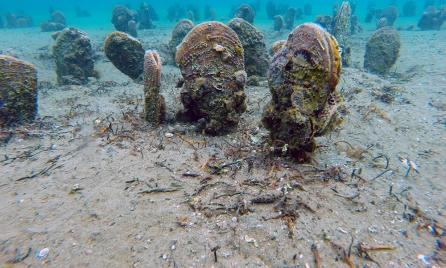Search
Media Advisory - 16/06/2022
Mediterranean noble pen shell: scientists from across the region meet in Tunis to adopt a restoration programme for this endangered marine species
Subject: Workshop for the adoption of a restoration programme for the Mediterranean noble pen shell, under the auspices of Her Excellency Mrs Leila Chikhaoui Mahdaoui, Minister of the Environment of Tunisia.
The event is organised by the Specially Protected Areas Regional Activity Centre (SPA/RAC), the biodiversity centre of UNEP Mediterranean Action Plan (UNEP/MAP) - Convention for the Protection of the Marine Environment and the Coastal Region of the Mediterranean (Barcelona Convention).
It will bring together scientists and representatives of Mediterranean environmental organisations.
Date : 20 and 21 June 2022
Place : Hôtel Novotel, Tunis, Les Berges du Lac 2
Part of the event (Opening and Session 1 on Day 1 and the Conclusions and Recommendations session on Day 2) will be broadcast live on the SPA/RAC YouTube channel.
Read the detailed programme of the event
Background :
The Mediterranean noble pen shell, Pinna nobilis, is a species that lives only in the Mediterranean Sea. It is the biggest marine bivalve mollusc in the region, reaching 1-meter length. The Mediterranean noble pen shell provides a habitat for several species, of which scientists have identified 146 so far.
During the 1980s, Pinna nobilis populations declined due to fishing activities, ornamental harvesting and anchoring. Protection measures undertaken under the Barcelona Convention and its Protocol concerning Specially Protected Areas and Biological Diversity in the Mediterranean have helped restore the species. But in 2016, a mass mortality event occurred in the southwestern Mediterranean, with mortality rates reaching 80-100%. The problem is getting worse and is currently affecting the Spanish, French, Italian and Tunisian coasts.
The protozoan Haplosporidium pinnae, a pathogenic micro-organism that affects the mollusc’s digestive system, was initially considered as the main cause of mortality. More recent studies have linked several bacteria to the disease. This suggests that a multifactorial disease may be responsible for the mass mortality.
As soon as the problem appeared, local restoration initiatives were undertaken. Based on the various experiences and studies carried out, a regional restoration programme for Pinna nobilis has been prepared by the consortium implementing the Life Pinna project, coordinated by the regional agency for the protection of the Ligurian environment (Italy) and of which SPA/RAC is a partner.
The objective of this programme is to have an operational action plan for the whole region, which the Barcelona Convention framework could facilitate the implementation through cooperation and collaboration mechanisms.
This activity coincides with the start of the UN Decade of Ecosystem Restoration and comes ahead of the new conservation decade that aims to protect 30% of the world's oceans, seas and continents by 2030.
NB: Following the workshop, a training course to demonstrate the restoration techniques for the Mediterranean noble pen shell will be organised by SPA/RAC in Kerkennah from 28 to 30 June 2022. This will include collecting Pinna nobilis juveniles and placing them in rearing sites to boost recolonisation.
Notes to editors:
The Mediterranean noble pen shell, Pinna nobilis, is included in the Annex II “List of endangered or threatened species” to the Protocol concerning Specially Protected Areas and Biological Diversity in the Mediterranean of the Barcelona Convention and the Annex IV of the EU Habitats Directive 92/43/EEC (EEC 1992).
In 2019, the species was assessed for the IUCN Red List of Threatened Species and was listed as Critically Endangered in line with the A2be+4be criteria.
The Pinna nobilis restoration activities carried out by SPA/RAC are supported by the UNEP Regional Seas Programme - 2021 Swedish International Development Cooperation Agency (SIDA) allocation in the Mediterranean sub-basin.
The Life Pinna project, implemented by a consortium coordinated by the regional agency for the protection of the Ligurian environment (Italy), is supported by the European Union's Life programme.
For further information, please contact :
- Ms Dorra Maaoui, Communications Assistant, SPA/RAC : dorra.maaoui@spa-rac.org




Find Us On...